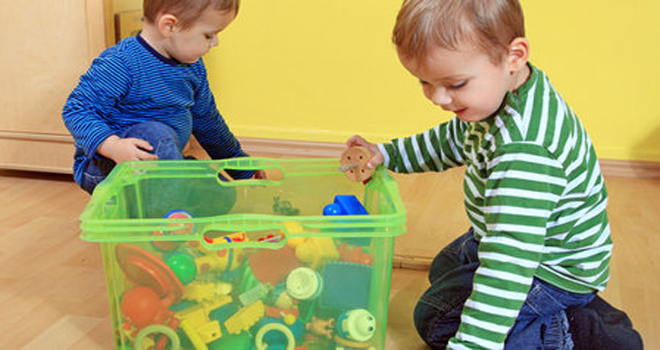“You are not interested in anything”, “do something at least already” - such words can often be heard from parents. What can we do to make our children interesting?
It is difficult to find a child who would be happy to clean his own room, wash dishes, get up early in the morning to go to kindergarten or school. When children are forced to do something complicated or uninteresting, at best they refuse. Often such situations lead to conflicts and abuse. We have gathered expert advice for you to help you learn how to “manage” children. You will be able to create a child’s motivation to learn, develop and complete various tasks instead of forcing him to do so.
Review the reward system
There is one real story how a man taught his little daughter to a pot, giving her sweets. Once, when there were no sweets at hand, he tried to give the baby an “imaginary” chocolate bar. The girl smiled, jumped from the pot, but he was empty. Dad asked his daughter what it was. She replied that she was pretending to pee in a pot.
This story is a clear demonstration of how smart and resourceful children are. Despite his age, kids quickly get used to the situation and find ways to earn encouragement without fulfilling the requests of adults. Moreover, the research results show that the reward system provides only a short-term effect.
Small rewards for completed tasks help to overcome a temporary crisis - for example, when a child begins to learn letters or numbers. The reward motivates the little man to do something. Only with time does he begin to depend more and more on the reward: if the baby loses it, he stops trying. The same thing happens with adults: while a person is paid, he works conscientiously. If a person loses his salary, he will simply stop working, because he will have no motivation left.
This rule applies to activities that are fun. An interesting experiment was conducted by scientists at Stanford University. They gathered a group of children and invited them to draw with markers. The pastime itself is interesting, but this time it was also paid for. Children really liked to draw, but when they stopped paying, they refused to continue. It can be concluded that reward kills passion and interest even in pleasant pursuits.
How to form positive habits in a child, if not with the help of small bribes? Experts say that the task of parents is to inspire children. Focus your child on how pleasant it becomes when you learn a new skill, and mom and dad are proud of you. So he will begin to feel satisfaction from his successes. Did the child learn to ride a bike? Praise him, say that he should be proud of himself, because it was difficult to master this skill. A sense of mastery motivates to develop further.
We also read: how to encourage a child
Talk to your child like an adult
An important element in creating a child’s motivation is face-to-face conversations. All children are curious, so you just need to invite them to listen to how it works and why you need this and that - such conversations kindle interest in different things and activities. It also stimulates intellectual activity.
Imagine this situation. For cleaning the room, the mother promises her son ice cream. Dad does not encourage the child, but the kid fulfills his request to lay toys with great zeal. How is this possible? It's just that every time a father admires how pleasant it is to be in a room after cleaning, what a clever son is. So the child will feel adult and independent.
If children refuse to do something, adults need to put themselves in their place, experts advise. This will help you find the right arguments and prove to the child the importance of the work that he needs to do. Does your son not want to clean the room and says he is tired after training? Offer him a tasty meal first, and then get down to business. Do not use the words “obliged”, “should”, “necessary”. If it will be difficult for the child without your help, offer it.
When a child does something, ask him about his feelings and sensations. He will be pleased with your attention, so a pleasant association will appear. It is also useful to offer your child your help, expressing your sympathy in this way. He will understand that his parents are on his side, and there is no point in fighting them.
Consider the possibilities of the child
Remember one simple thing: if the child does not know how or cannot do something, then any bribes and punishments will be useless. Remember how the baby was proud when he first wrote his name or put on his shoes. He rejoiced in repeating these actions, because the feeling of mastery inspires. Draw this analogy with skills that the child does not have yet.
Avoid criticism and coercion
Almost all babies enjoy the fulfillment of different tasks of their parents, but you need to adapt your requirements to the characteristics of the child. If he likes to lay the laundry on the shelves, and adults criticize him for his slowness and sloppiness, this kills all the excitement. Therefore, let the child do what he is interested in. Do not criticize him if he does not succeed.
For the child to do what he does not like, show your imagination. If the girl loves dolls, let the doll ask her to remove the scattered toys. Give children the right to choose: brush their teeth before or after bathing, help mom wash, sweep, or do the dishes. A sense of freedom and control over the situation enhances motivation, while coercion causes only negative reactions. Children love to feel independent. So let them think that it was not their parents who made them do something, but they personally made that decision.
Express your gratitude
The son himself woke up in the morning on an alarm clock and was going to school? Daughter slept all night in her bed and did not run to her parents? Be sure to tell the children that all this is very important to you and you value it.
Every child wants to please their parents, and the response in the form of gratitude and praise is the best motivation. Tell the child how much you value his success, but focus not on the result, but on the efforts and progress made.
Set a good example
[sc name = ”ads”]
Many will be able to recall this situation: the child asks or asks when you are talking on the phone, and you ask him to wait and turn away. In such cases, children continue to molest their parents and, as a result, throw a tantrum so that they pay attention to them. The problem is not even the tantrum itself, but the fact that the child will remember this model of behavior. Having matured, he will do the same. Therefore, either end the conversation by phone, or tell the child how much he will need to wait.
We also read:
- 9 simple tips on how to teach your child home help
- Why should a child help with household chores
- Lazy child - how to deal with childhood laziness
How to motivate a child to study and work / psychologist Roman Edvakin
At what age should a child be taught to help around the house?












